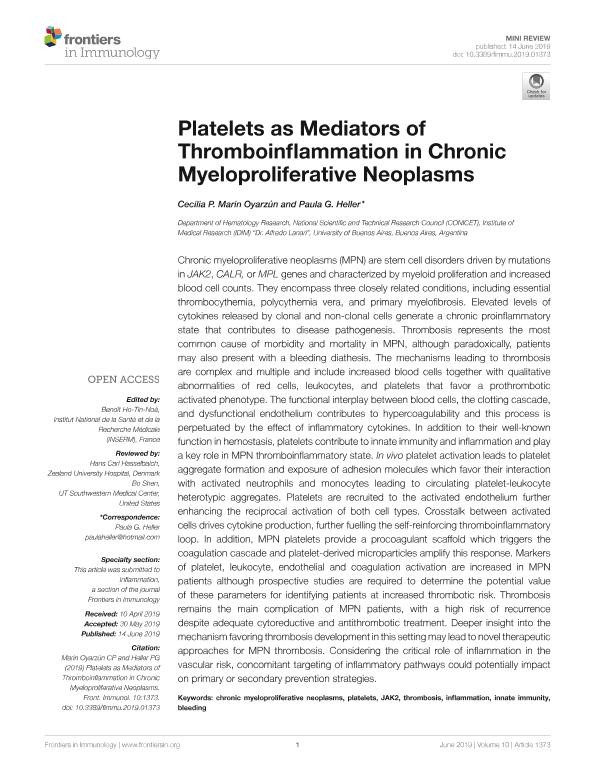Mostrar el registro sencillo del ítem
dc.contributor.author
Marin Oyarzún, Cecilia Paola

dc.contributor.author
Heller, Paula Graciela

dc.date.available
2020-05-14T20:26:51Z
dc.date.issued
2019-06-14
dc.identifier.citation
Marin Oyarzún, Cecilia Paola; Heller, Paula Graciela; Platelets as mediators of Thromboinflammation in chronic Myeloproliferative Neoplasms; Frontiers Research Foundation; Frontiers in Immunology; 10; JUN; 14-6-2019; 1-9
dc.identifier.issn
1664-3224
dc.identifier.uri
http://hdl.handle.net/11336/105173
dc.description.abstract
Chronic myeloproliferative neoplasms (MPN) are stem cell disorders driven by mutations in JAK2, CALR, or MPL genes and characterized by myeloid proliferation and increased blood cell counts. They encompass three closely related conditions, including essential thrombocythemia, polycythemia vera, and primary myelofibrosis. Elevated levels of cytokines released by clonal and non-clonal cells generate a chronic proinflammatory state that contributes to disease pathogenesis. Thrombosis represents the most common cause of morbidity and mortality in MPN, although paradoxically, patients may also present with a bleeding diathesis. The mechanisms leading to thrombosis are complex and multiple and include increased blood cells together with qualitative abnormalities of red cells, leukocytes, and platelets that favor a prothrombotic activated phenotype. The functional interplay between blood cells, the clotting cascade, and dysfunctional endothelium contributes to hypercoagulability and this process is perpetuated by the effect of inflammatory cytokines. In addition to their well-known function in hemostasis, platelets contribute to innate immunity and inflammation and play a key role in MPN thromboinflammatory state. In vivo platelet activation leads to platelet aggregate formation and exposure of adhesion molecules which favor their interaction with activated neutrophils and monocytes leading to circulating platelet-leukocyte heterotypic aggregates. Platelets are recruited to the activated endothelium further enhancing the reciprocal activation of both cell types. Crosstalk between activated cells drives cytokine production, further fuelling the self-reinforcing thromboinflammatory loop. In addition, MPN platelets provide a procoagulant scaffold which triggers the coagulation cascade and platelet-derived microparticles amplify this response. Markers of platelet, leukocyte, endothelial and coagulation activation are increased in MPN patients although prospective studies are required to determine the potential value of these parameters for identifying patients at increased thrombotic risk. Thrombosis remains the main complication of MPN patients, with a high risk of recurrence despite adequate cytoreductive and antithrombotic treatment. Deeper insight into the mechanism favoring thrombosis development in this setting may lead to novel therapeutic approaches for MPN thrombosis. Considering the critical role of inflammation in the vascular risk, concomitant targeting of inflammatory pathways could potentially impact on primary or secondary prevention strategies.
dc.format
application/pdf
dc.language.iso
eng
dc.publisher
Frontiers Research Foundation

dc.rights
info:eu-repo/semantics/openAccess
dc.rights.uri
https://creativecommons.org/licenses/by/2.5/ar/
dc.subject
BLEEDING
dc.subject
CHRONIC MYELOPROLIFERATIVE NEOPLASMS
dc.subject
INFLAMMATION
dc.subject
INNATE IMMUNITY
dc.subject
JAK2
dc.subject
PLATELETS
dc.subject
THROMBOSIS
dc.subject.classification
Otras Medicina Básica

dc.subject.classification
Medicina Básica

dc.subject.classification
CIENCIAS MÉDICAS Y DE LA SALUD

dc.title
Platelets as mediators of Thromboinflammation in chronic Myeloproliferative Neoplasms
dc.type
info:eu-repo/semantics/article
dc.type
info:ar-repo/semantics/artículo
dc.type
info:eu-repo/semantics/publishedVersion
dc.date.updated
2020-05-05T16:03:47Z
dc.journal.volume
10
dc.journal.number
JUN
dc.journal.pagination
1-9
dc.journal.pais
Suiza

dc.description.fil
Fil: Marin Oyarzún, Cecilia Paola. Consejo Nacional de Investigaciones Científicas y Técnicas. Oficina de Coordinación Administrativa Houssay. Instituto de Investigaciones Médicas. Universidad de Buenos Aires. Facultad de Medicina. Instituto de Investigaciones Médicas; Argentina
dc.description.fil
Fil: Heller, Paula Graciela. Consejo Nacional de Investigaciones Científicas y Técnicas. Oficina de Coordinación Administrativa Houssay. Instituto de Investigaciones Médicas. Universidad de Buenos Aires. Facultad de Medicina. Instituto de Investigaciones Médicas; Argentina
dc.journal.title
Frontiers in Immunology
dc.relation.alternativeid
info:eu-repo/semantics/altIdentifier/url/https://www.frontiersin.org/articles/10.3389/fimmu.2019.01373/full
dc.relation.alternativeid
info:eu-repo/semantics/altIdentifier/doi/https://doi.org/10.3389/fimmu.2019.01373
Archivos asociados
